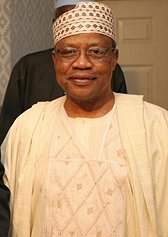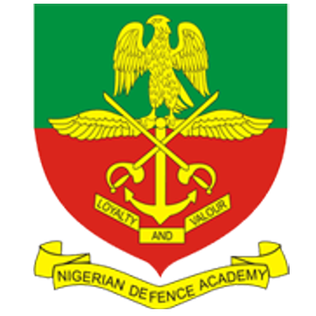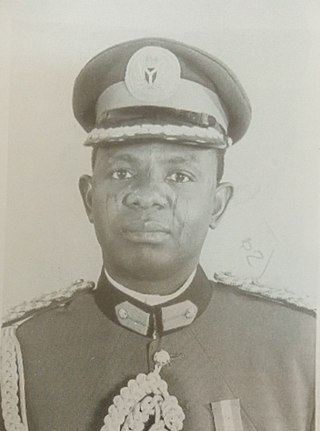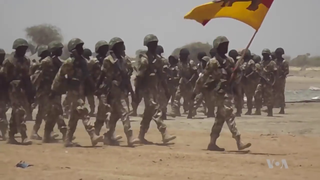Background and career
Born in Abaji,now present in Abuja. [1] He started his education at Native Authority Primary School in 1947,then he attend Kwara senior primary school Ugu-Beku from 1950 to 1957 and went to Provincial secondary school in Okene finished 1962. [3]
He enrolled in Nigeria Military Training College,Kaduna in 1964 and Royal Military Academy Sandhurst,United Kingdom in 1964 to 1965,then in 1968 he attended the Royal School of Artillery,United Kingdom,Odessa Military College in 1970,he later joined the Command and Staff College,Kaduna in 1976 for his senior military course and hold diploma in National Institute for Policy and Strategic Studies,Jos later in 2001 he was award Ph'D. [4] [5]
He command 32 field artillery regiment of Nigerian Army in 1970 and brigade command school of artillery in 1975 - 1979,chief military personnel officer,United Nation Interim Force Lebanon in 1981,Commander Corps of Signal 1983 and School of Artillery Brigade. [6] He was Army training and operations director in 1985 and was member of Armed Forces Ruling Council from 1985 - 1989 later in 1988 he was Commandant,Armed Force Command and Staff College,Jaji till 1990 there he retired and was appointed Minister. In 1993 he found the Hikma International Limited later he chairs the Administrative body in University of Nsukka 1995.

Ibrahim Badamasi Babangida is a Nigerian statesman and military dictator who ruled as military president of Nigeria from 1985 when he orchestrated a coup d'état against his military and political arch-rival Muhammadu Buhari, until his resignation in 1993 as a result of the post-12 June 1993 election which he illegally nullified.

Mamman Jiya Vatsa was a Nigerian general and poet who served as Minister of the Federal Capital Abuja, and was a member of the Supreme Military Council.
Domkat Yah Bali was a Nigerian army four-star general, who was Minister of Defence and Chief of Defence Staff from 1984 to 1990, and a member of the Supreme Military Council of 1984–1985, and the Armed Forces Ruling Council of 1985–1990.

George Agbazika Innih was a Nigerian Army general and statesman. He was the military governor of Bendel and Kwara States.

Martin Luther AgwaiMSS DSS fwc is a retired Nigerian Army general who served as Chief of Defence Staff and Chief of Army Staff. He was the 13th Pro-Chancellor and Chairman of Governing Council of the University of Calabar

The Nigerian Defence Academy (NDA) is a military university based in Kaduna, Nigeria, that trains officer cadets for commissioning into one of the three services of the Nigerian Armed Forces: the Army, the Navy, and the Air Force. The duration of training at the Nigerian Defence Academy is five years.

The Nigerian Army (NA) is the land force of the Nigerian Armed Forces. It is the largest component of the Nigerian Armed Forces. The President of Nigeria is the Commander-in-Chief of the Nigerian Army, and its professional head is the Chief of Army Staff, who is the highest ranking military officer of the Nigerian Army. It is governed by the Nigerian Army Council (NAC). The Nigerian Army is operationally and geographically divided into ten divisions, the basic field formation. The army has been involved in operations throughout the country, most especially during the Nigerian Civil War, and has undertaken major operations abroad. Nigerian Army officers have served as chiefs of defence in other countries, with Brigadier General Maxwell Khobe serving as Sierra Leone chief of staff in 1998–1999, and Nigerian officers acting as Command Officer-in-Charge of the Armed Forces of Liberia from at least 2007. The Nigerian Army is globally renowned for its professionalism and experience in counterterrorism and counterinsurgency; in 2022, the Nigerian Army won the award for the "Best Land Force in National Defence in Africa" in Banjul, Gambia.
The 1966 Nigerian Counter-coup was the second of many military coups in Nigeria. It was masterminded by Lt. Colonel Murtala Muhammed and many other northern military officers. The coup began as a mutiny at roughly midnight of 28 July 1966 and was a reaction to the killings of Northern politicians and officers by some soldiers on 15 January 1966. The coup resulted in the murder of Nigeria's first military Head of State General Johnson Aguiyi-Ironsi and Lt Colonel Adekunle Fajuyi in Ibadan by disgruntled northern non-commissioned officers (NCOs). Upon the termination of Ironsi's government, Lt. Colonel Yakubu Gowon was appointed Head of State by the coup conspirators.
Sani Bello is a Nigerian statesman and military administrator who served as Governor of Kano State from 1975 to 1978. After his retirement, he amassed an enormous fortune through investments in oil, telecommunications and electricity; going on to establish the Sani Bello Foundation.
Joshua Mamman Madaki was Governor of Bauchi State, Nigeria from December 1987 to August 1990 and then of Plateau State from August 1990 to January 1992 during the military regime of Major General Ibrahim Babangida.

Hamza Abdullahi was a Nigerian statesman and military administrator who served as Governor of Kano State from 1984 to 1985; and Minister of the Federal Capital Territory from 1986 to 1989.

Abba Kyari was a Nigerian military officer who served as governor of North-Central State, Nigeria after it was created from the Northern Region during the military regime of General Yakubu Gowon.
Brigadier General (retired) Ahmed Abdullahi was Military Administrator of Kwara State, Nigeria between December 1987 and July 1988 during the military regime under General Ibrahim Babangida.

Suraj Alao Abdurrahman, was a Nigerian Army general who served as the Command Officer in Charge of the Armed Forces of Liberia, with former Liberian president Ellen Johnson Sirleaf as the Commander-in-Chief. According to then President Johnson Sirleaf, General Abdurrahman "was an exceedingly exceptional gentleman officer whose contributions lifted the Armed Forces of Liberia to professional greatness and emplace our military amongst UN peacekeepers”.
Ibrahim Ahmed Bako was a senior officer in the Nigerian Army who played a principal role in two Nigerian military coups: the July 1966 counter-coup and the December 1983 coup. The 1983 coup ousted the democratic government of Shehu Shagari while the July 1966 coup ousted the military government of General Ironsi. Bako was killed during the December 1983 coup d'état.

The 3rd Armoured Division is a division of the Nigerian Army. The division is headquartered at Jos, Plateau State.
Yohanna Yarima Kure was a Nigerian army officer. He was a member of the Armed Forces Ruling Council (1985-1987) at the onset of Ibrahim Babangida's administration and was member of the Supreme Military Council of Nigeria (1983–1985) in Buhari's military government.

Al-Amin Musa Daggash is a retired Air Marshal of the Nigerian Air Force who served as the 7th Chief of Defence Staff of Nigeria from 1998 to 1999 under the General Abdulsalami Abubakar regime.
Justice Saddik Abdullahi Mahuta is the longest-serving chief judge in Katsina State, Nigeria from 1991 to 2013, and he administered the oath of office to civilian governors of Katsina State from Alhaji Sa'idu Barda in 1991 to Barrister Ibrahim Shehu Shema in 2011.
Faruk Yahayapsc(+) NAM GSS ndc (Chile) FCMH GSMH MIAD is a retired Nigerian army lieutenant general and a former Chief of Army Staff of Nigeria, appointed by President Muhammadu Buhari on 27 May 2021. after the death of the former Chief of Army Staff, Ibrahim Attahiru who died in the Beechcraft King Air 350i plane crash near Kaduna International Airport.
This page is based on this
Wikipedia article Text is available under the
CC BY-SA 4.0 license; additional terms may apply.
Images, videos and audio are available under their respective licenses.










